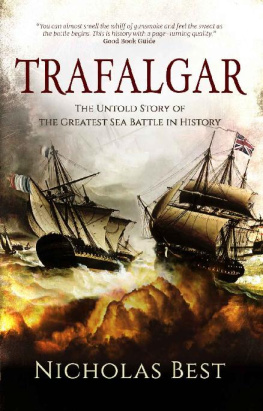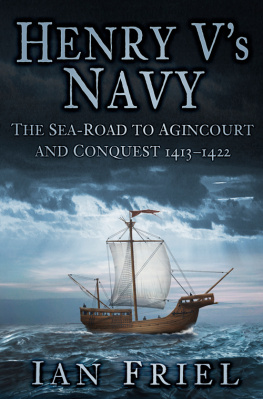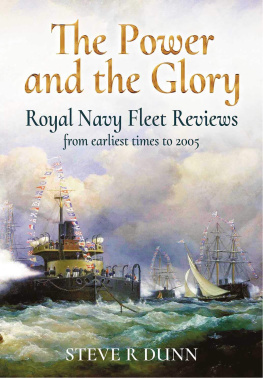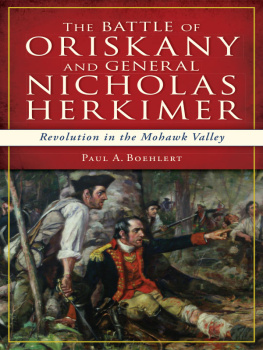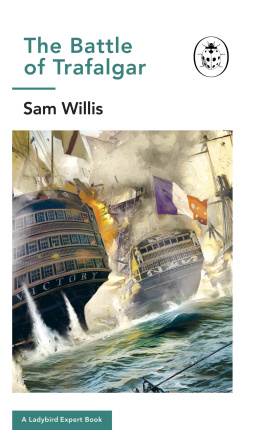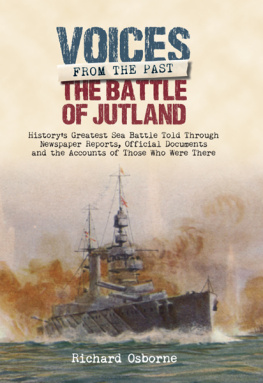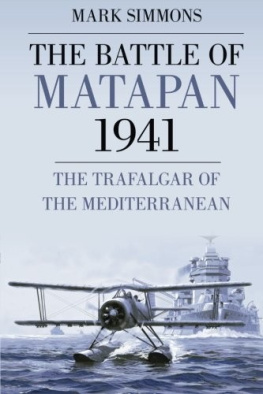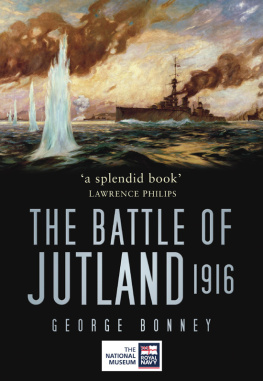TRAFALGAR
THE UNTOLD STORY OF THE GREATEST SEA BATTLE IN HISTORY
NICHOLAS BEST

All Rights Reserved
Copyright Nicholas Best 2005, 2018
First published in 2005 by Weidenfeld & Nicolson
This edition published in 2018 by:
Thistle Publishing
36 Great Smith Street
London
SW1P 3BU
www.thistlepublishing.co.uk
With thanks to Tom Sharpe,
who lent me the book that got me started.
Thanks also to Nancy Sharpe, Tom Pocock,
Mike Dover, Tim Atkinson, Pam and Cavan Browne,
Nick and Melanie Marden, Professors Mike Bickle
and Gareth Roberts, Hazel Bickle, Colin White of
the National Maritime Museum, and Kay Hoar,
librarian of the Kings School, Canterbury.
Trafalgar was not only a great sea battle, it saved Britain from invasion by Napoleon. That is why this book, which rattles along excitingly, gave me fresh appetite for the subject. It sets Nelsons victory in that context the risks of 1940 were just as grave in 1805... The battle is grippingly described with a Master and Commander/Patrick OBrian touch
Peter Lewis, Daily Mail
Nicholas Best uses eyewitness accounts to recreate the tension and uncertainty of the campaign that led to the battle, and to describe the carnage and the glory of Trafalgar itself
Church Times
This gripping book tells the story of Britains legendary naval victory on October 21, 1805 in which the national hero, Admiral Lord Nelson, was killed by a French sharpshooter... Nicholas Best has done an excellent job describing the build up to the Battle and the primitive conditions on the ships... This book is replete with fascinating details
Anthony Looch, Glasgow Evening Times
You can almost smell the whiff of gunsmoke and feel the sweat on both sides as the battle begins. This is history with a page-turning quality
Good Book Guide
A spiffing good read. Unusually for a Trafalgar book it tells you almost as much about the British on land as the Royal Navy at sea and its full of interesting period detail about how the British lived in 1805 as they waited for Napoleons army to invade
Period House
None is likely to be more comprehensive or gripping than this one, which describes the Royal Navys triumph over the French which effectively scuppered Napoleons threat to invade Britain... He is unsparing in his details of the bloodshed wrought by cannons and cutlass-wielding seamen who boarded the shattered ships
Birmingham Post
Very racy and exciting
John Turner, BBC Radio Bristol
Marvellous. Compulsively readable
John Florence, BBC Radio Leicester
Fascinating insight. Super
Mark Seaman, BBC Radio Wiltshire
Nicholas Best grew up in Kenya and graduated from Trinity College, Dublin before joining the Grenadier Guards. He became a financial journalist after leaving the army and later a full-time author. He has written novels, travel and history books, and was the Financial Times fiction critic for ten years. He lives in Cambridge.
By Nicholas Best
Trafalgar: The Untold Story of the Greatest Sea Battle in History
Happy Valley: The Story of the English in Kenya
Where Were You at Waterloo?
Tennis and the Masai
The Greatest Day in History
Five Days that shocked the World
Seven Days of Infamy
B oulogne, 1805. Napoleon studies Dover Castle through a giant telescope. Behind him stands an army of 167,000 men, superbly trained and itching to invade. Behind them Joseph Fouch, Frances Minister of Police, who attends public executions with human ears dangling from his hat.
Across the Channel, William Pitt awaits the French with the Cinque Port Volunteers, a ragbag force of 3,000 yokels armed initially with pikes and pitchforks.
In between sails the Royal Navy, desperately short of ships and men, yet blessed in Lord Nelson with a leader of outstanding ability. All are adamant that English ears must never dangle from Fouchs hat.
This is the story of the men and women of many nations who fought at Trafalgar, told in their own dramatic words. It is also the wider story of characters as diverse as Madame Forty Thousand Men, doyenne of the Grand Armys prostitutes, Captain de lOrt, Austrian eyewitness at Ulm, and the anonymous but beautiful English blonde who did her best to get Napoleons invasion plan out of him at Boulogne. Unaccountably neglected by Trafalgar historians, their tales are all the more fascinating for being very rarely seen in print.
CONTENTS
I do not say the French cannot come.
I only say they cannot come by sea.
Admiral St Vincent
I made a mistake trying to conquer the English.
They are a brave people.
Napoleon Bonaparte
CHAPTER 1
NAPOLEON REVIEWS THE ARMY OF ENGLAND
T he Emperor was coming and all of Boulogne was en fte. Along the cliffs north of the town, the men of Napoleons army awaited his arrival. Almost 100,000 soldiers the greatest army France had ever assembled were gathered for his inspection. There were regiments of Guards drawn up on the slopes of Terlincthun. There were regiments of dragoons and light infantry, companies of Voltigeurs and artillery, rows of prancing horses and squadrons of cavalry in outrageous uniforms. It was not just the French army that was assembled at Boulogne. It was the grandest military spectacle the world had ever seen.
For many of the troops, fidgeting nervously as they waited for Napoleon to arrive, 16 August 1804 was going to be a day they would remember for the rest of their lives. A day their descendants have remembered too, ever since. The day the Emperor embraced them personally and bestowed on them the newly founded Lgion dhonneur, Frances highest decoration.
The ceremony had been planned for months. Boulogne had been specially decorated for the occasion. There were flags at every window and swathes of coloured bunting across the streets. There were triumphal arches, allegorical statues and signs pointing out The Road to England towards the harbour. The road was lined with excited crowds, the girls wearing traditional fte costumes and patriotic ribbons, the children clutching tricolours in their hands. In the vale of Terlincthun, the massed bands of sixty regiments were waiting to greet Napoleon. Along the cliff tops, batteries of guns stood ready to fire a salute in his honour. Everything was in place, just waiting for the Emperor to appear.
In the middle of the vale, where he was to address the troops, a magnificent podium had been erected at the summit of a small rise. The podium was twice the height of a man, approached on either side and from the front by three sets of wooden steps. On top of it stood a splendid throne, said to have been used 1,000 years earlier by Dagobert, the legendary king of the Franks.
Behind the throne stood a theatrical backdrop of statues in shining armour and imperial eagles crowned with laurel wreaths. There was also a display of military banners, more than 200 of them, arranged in a fan shape around the podium. The banners were bloodstained and riddled with shot. They had been captured at the battles of Lodi, Arcola, Marengo and a score of other French triumphs. Now they stood fluttering in the breeze of the English Channel, eloquent testimony to the courage of the army that had captured them.
The army itself stood facing the podium in a giant semicircle. It was a fine sight, the pick of French manhood. Almost all the officers and NCOs had seen active service in recent campaigns, as had more than half the men. Their commanders were Michel Ney, Nicolas Soult and Louis Davout, figures legendary in the annals of war. The army had been camped at Boulogne for more than a year, training furiously for the assault on England. The troops were fully prepared and ready to go. Only a few more days now, they had been promised, just a few more days and then the invasion would begin. Their day of glory would arrive.
Next page
